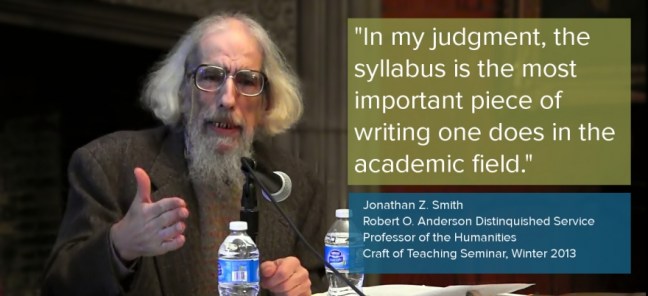A start of a new year, the ominous weather forecast, the beginning of yet another semester…if this moment is anything, it is one where we can signify our resolve by any number of means. And in that unremarkable fact, we might ask how and why such moments become remarkable.
Currently many students of religion are using this occasion to reflect on the passing of Jonathan Z. Smith, a prolific scholar who challenged the field to ask how and why about so much that we take for granted.
I’m not going to pretend to have known the man, nor will I count myself among those best tutored in his scholarship. On the other hand, I am astonished by the kind of impact a stranger has had on my own career path. Given my own junior standing, maybe the same reaction should befit any veteran scholar. But his legacy–like his scholarship–is a cut above so much of the rest that one is never quite clear on how deep it goes.
I’m of a generation of scholars fortunate to have been introduced to his work in the undergraduate classroom. And in 2008, Smith was the president of the Society of Biblical Literature, which just so happened to be my first annual meting. His address, “Religion and Bible”, called for the kind of “‘massive syncretism'” of theoretical tools, data sets, and conversation partners that I would seek out in the Institute for Signifying Scriptures (the center of my doctoral training), the Society for Comparative Research in Iconic and Performative Texts, the Society of Religion as an Analytical Discipline, and the North American Association for the Study of Religion. This is in addition to my membership in the Society of Biblical Literature and the American Academy of Religion.
Throughout the most recent (and concurrent) annual meetings, I had a number of conversations about being “too SBL for AAR and too AAR for SBL” in the eyes of some of my colleagues. I chalk up my free agency to him. or what I understood of his work, the critical interrogation of culture must confound canonical boundaries in all their forms, not submit to them.
As I take this moment to get my mind right, I am reminded of how his method of scholarship challenged the professional truisms that I’ve also chaffed against. I’ve been in the game long enough to have heard the following statements a few times:
- You can’t be a so-called generalist and contribute to the field.
- Teaching isn’t really scholarship.
- Essays are fine, but you can’t make a career out of them in a book discipline.
If you know his work, then you’re aware of just how arbitrary these ideas are. In this season of reflection I hope that I we can focus on doing the work the best way we each know how that we might explore the questions our particular efforts will bring to the broader conversation on our curious object of study, the human and all its names.
Anyway, I don’t have too much else to say. I’ll close with a few links.
Dr. James Tabor has posted the official obituary on his blog.
Dr. Russell McCutcheon’s reflection, “Let’s Get to Work,” is definitely worth a read.
If you’re on Twitter, check out the hashtag #JZSmith to see some of the questions and a-ha! moments prompted by his work.
 Richard Newton, PhD is curator of Sowing the Seed and Assistant Professor of Religious Studies at Elizabethtown College. His scholarship focuses on the anthropology of scriptures. Follow him on Twitter and Instagram @seedpods
Richard Newton, PhD is curator of Sowing the Seed and Assistant Professor of Religious Studies at Elizabethtown College. His scholarship focuses on the anthropology of scriptures. Follow him on Twitter and Instagram @seedpods

